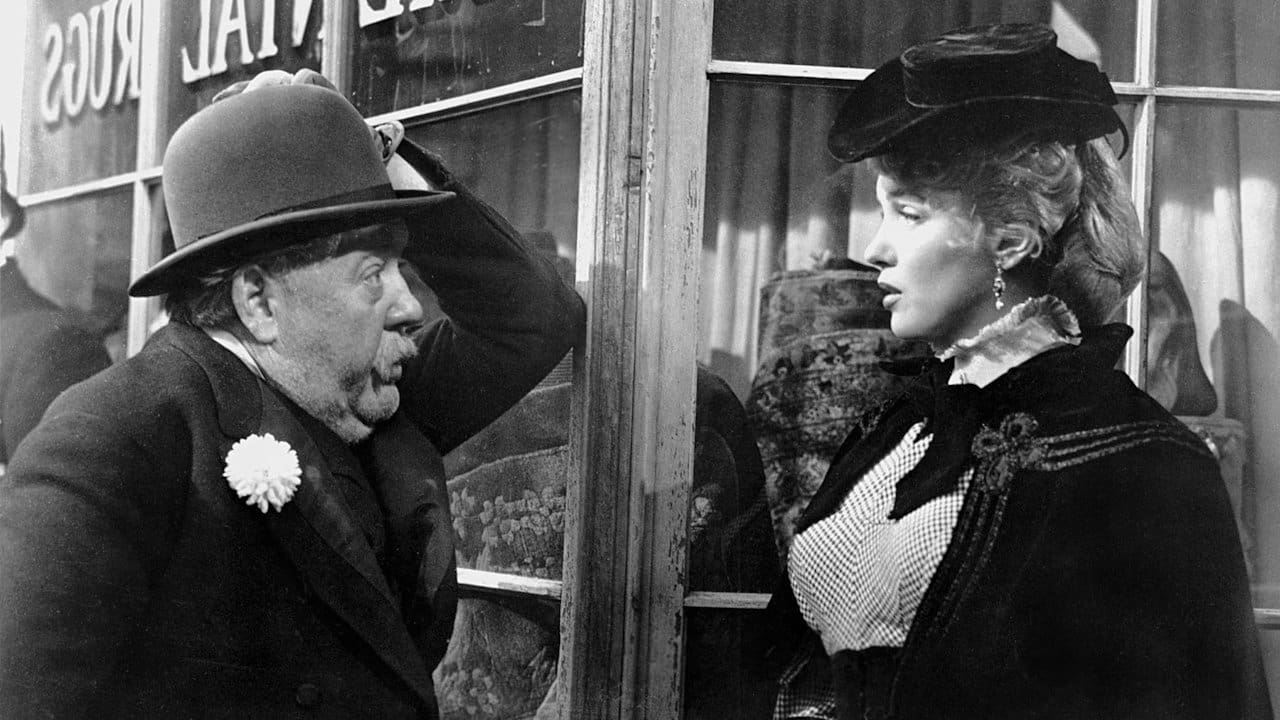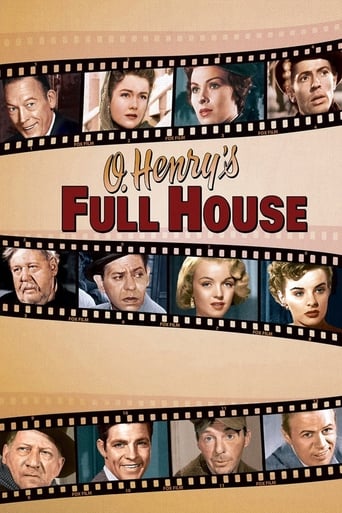

"O. Henry's Full House" is a film divided in five segments telling five wonderful tales in the beginning of the Twentieth Century.1) "The Cop and the Anthem": the winter is coming and the homeless drifter Soapy (Charles Laughton) wants to go to jail for three months to get shelter and food. His partner Horace (David Wayne) suggests they look for shelter with the Salvation Army, but Soapy refuses. He forces many situations to be arrested but he is always forgiven. When he goes to the church, there is a miracle and Soapy decides to seek a job position. Will he succeed?Directed by Henry Koster, this segment tells an ironic story of a bum with top-notch performance of Charles Laughton and a cameo of Marilyn Monroe.2) "The Clarion Call": when a thief kills a man, the police investigators do not have any lead to follow. Police Sergeant Barney Woods (Dale Robertson) sees a pen that was found in the crime scene and he seeks out a man called Johnny Kernan (Richard Widmark). He finds Johnny that invites Barney to drink with him and they go to his hotel room. Johnny recalls their youth, when they were friends but Barney tells that he must arrest him since he recognized the pen that belonged to Johnny. However the criminal recalls that Barney owes him $ 1,000 that Barney lost in a card game. Barney unsuccessfully tries to raise the money to quit the debt. He decides to tell to the Chief of Police but out of the blue, he sees the spotlight on "The Clarion Call" and and runs to the newspaper. What did he see?Directed by Henry Hathaway, this segment tells the story of an honest policeman that has a debt with a criminal that is wanted by the police. Richard Widmark is excellent in the usual role of a felon.3) "The Last Leaf": When the lover of the twenty-one year-old Joanna Goodwin (Anne Baxter) breaks up with her, she wanders on the snow and gets pneumonia. Her older sister Susan Goodwin (Jean Peters) finds that Joanna does not want to live anymore and is following the leaves that keep falling from a tree. Their upstairs neighbor, the painter Behrman (Gregory Ratoff), tries to help the girls the best he can. Will he be able to save Joanna?Directed by Jean Negulesco, this is the most sensitive and touching segment, with a heartbreaking conclusion. Anne Baxter is very beautiful in the role of a young woman with broken heart.4) "The Ransom of Red Chief": the con men Sam 'Slick' Brown (Fred Allen) and Bill Peoria (Oscar Levant) flee to the countryside in their car and plot to kidnap the boy J.B. Dorset (Lee Aaker) to ask for ransom to his parents. But soon they find that the boy is a little devil.Directed by Howarks, the segment is a funny comedy about two confidence men that make a wrong move kidnapping an evil boy. Lee Aaker's character seems to be Dennis, the Menace, created in 1951.5) "The Gift of the Magi": In Christmas Eve, Della (Jeanne Crain) and her beloved husband Jim (Farley Granger) are penniless and in love with each other. Jim dreams on giving a tiara to Della since she has a wonderful hair and Della wants to give a chain to the pocket watch of Jim. On the Christmas night, they find a way to buy the gifts.Directed by Henry King, this segment is a delightful love story with an ironic and funny conclusion. My vote is eight.Title (Brazil): "Páginas da Vida" ("Pages of the Life")
... View MoreI first saw this movie on TV as a child in the 1960s, and never watched it again until now (2005), but it's strange how many characters and even specific shots lingered in my mind all those years. This is a gem that has something for everyone: sentimentality, humor, pathos, and loads of good performances. "The Cop and the Anthem" is probably the most tightly written of them all, with subtle touches of humor throughout (besides the most obvious gags). If I had to single out one performer who delighted me the most it would be David Wayne, doing a twitchy down-and-outer playing off of Laughton's haughty tramp (especially just having seen him play a totally different character in ADAM'S RIB just a week ago).As an old thespian friend of mine would say, "The Last Leaf" could bring a tear to a glass eye. And in "Red Chief," Fred Allen and Oscar Levant make a strange but fun team. Not having seen Richard Widmark in the other movie mentioned in reviewer's comments, I could only think how much he reminded me of Frank Gorshin in various roles he played in the 60s. Watch this segment again and think "Frank." Your whole family will like this movie. Why doesn't someone bring it out nice and crispy clean on DVD?
... View MoreO'Henry's short stories are a joy to read. This master of the genre left behind a number of small gems that never seem to go out of style, as they are timeless. The author had an incredible eye to spot situations in which human beings are shown at a moment of crisis only to have fate intervene with ironic twists."O'Henry's Full House" offers five of his best works directed by five distinguished directors. Howard Hawks, Henry Hathaway, Henry Koster, Henry King and Jean Negulesco do an excellent job in bringing the five stories to the screen adapted by some of Hollywood's best writers of the time in which they were filmed. John Steinbeck does the introductions.The first story, "The Cop and the Anthem" presents us with Soapy, brilliantly played by Charles Laughton, as a poor homeless person in the middle of a crude winter in New York who wants to be taken to jail in the worst way. He goes to extremes to have him sent to prison, without much luck. David Wayne plays his pal Horace and Marilyn Monroe is seen briefly at the end.The second installment, "The Clarion Call" shows a police detective, Barney, and his adversary, Johnny, a man to whom he is tied by a loan that stands between them. Dale Robertson is Barney and an annoying Richard Widmark plays the bad guy. Unfortunaly, Mr. Widmark's performance full of silly laughter and tics ruined the story for this viewer.The third tale is "The Last Leaf". We have two sisters in the middle of a blizzard in Manhattan. Joanna, played by the fine Anne Baxter, who we see after an apparent breakup with her boyfriend, gets pneumonia as a result of her exposure to the elements. Her good sister Susan goes crazy trying to nurse Joanna to health. Enter the painter Behrman, who is the upstairs neighbor to the rescue. Behrman sells his painting in order to buy medicine and when Joanna in her feverish state believes the tree across the street full of dry leaves is an omen, because as the leaves keep falling, so are the chances for her to get well. Thanks to the caring painter, Joanna survives. Jean Peters plays the kind sister and the wonderful Ratoff is the painter.The fourth segment is the weakest. "The Ransosm of Red Chief" presents us two con men in Alabama kidnapping a young boy who is wiser and acts much older than what the two con men thought. Fred Allen and Oscar Levant play the kidnappers.The last, and perhaps the best realized story of the O'Henry's stories is the unforgettable "The Gift of the Magi", which is the equivalent to Dickens' "A Christmas Carol". As directed by Henry King and played wonderfully by a beautiful Jeanne Crain and the handsome Farley Granger, this is a story about love and sacrifice under the worst possible circumstances. Della and Jim, with their youth, are penniless, yet, they sacrifice whatever little each one has in order to give the other partner a small token as proof of their love.This is an immensely endearing film thanks to the legacy of O'Henry.
... View MoreI had never seen this film until a couple of days ago and it was an interesting experience. I enjoyed John Steinbeck's narration of the five O'Henry stories. It was obvious he greatly respected William Sidney Porter as writer and as human being.The segments are nicely done. Charles Laughton has a fabulous turn as a gentlemen tramp who's just simply looking for his room and board for the winter by trying to commit a minor infraction that will give him jail time during what looks like a rough winter coming. Anne Baxter and Jean Peters are also good as a pair of sisters one of whom has convinced herself she'll die if the last leaf falls off of a bush. Fred Allen and Oscar Levant do nicely as a pair of confidence men turned kidnappers who have the tables turned on them by their victim. You have to have confidence to be a confidence man is Allen's advice to Levant. Nice to see that legendary radio comedian on the big screen. And Farley Granger and Jeanne Crain are touching in the classic Christmas storyThe Gift of the Magi.The only jarring note comes from one of my favorite actors, Richard Widmark. He and Dale Robertson do a turn as a bad guy and coprespectively in a short story called The Clarion Call. Widmark has committed a murder and Robertson knows it, but can't bring himself to arrest him because of a monetary debt from years past.The O'Henry stories are set in the gaslight era of New York. Widmark does not do anything original but just repeats his Tommy Udo character from Kiss of Death. He even dresses like him, the standard black dress shirt and white tie are jarringly out of place here. The director of this segment was Henry Hathaway who did do Kiss of Death as well sothat might offer an explanation. But it just looks ludicrous.Other than this segment the film is fine. 7 out of 10.
... View More